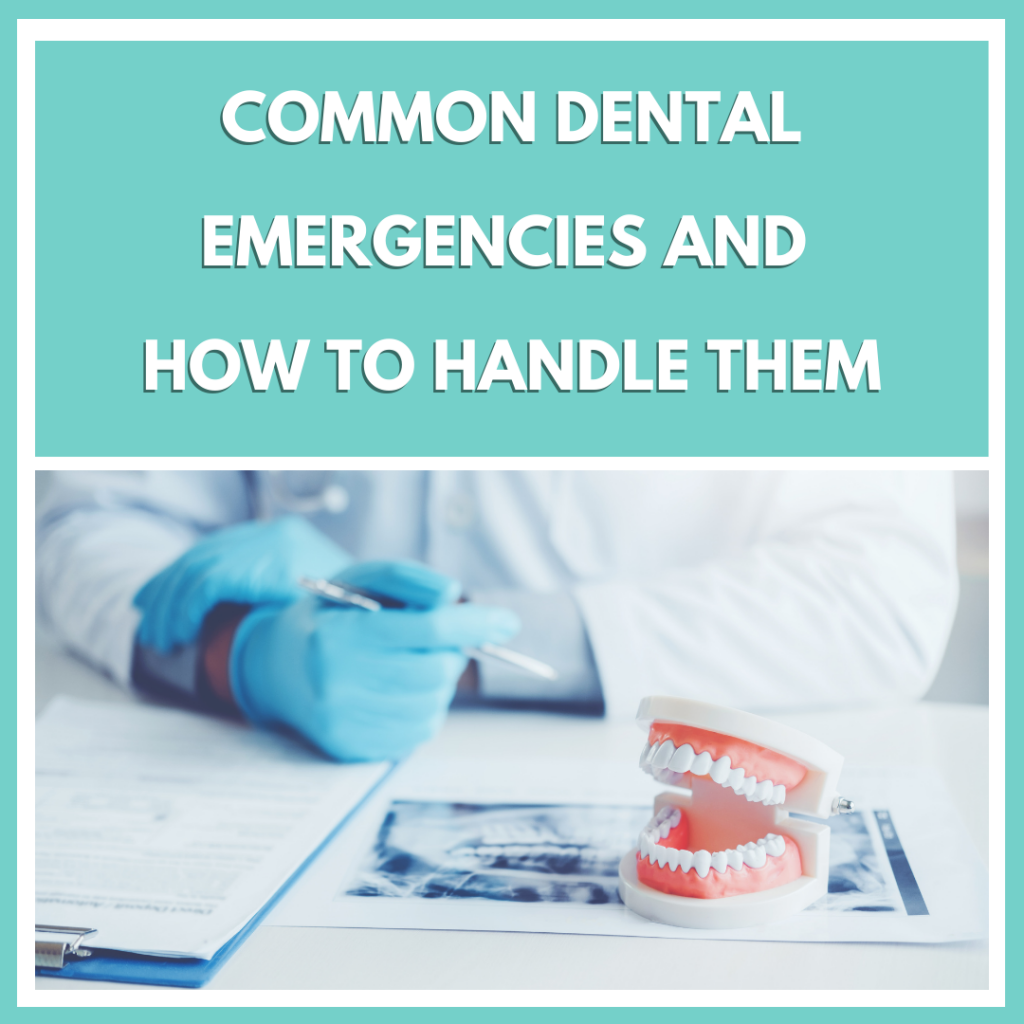

We’ve all been there –going about our day and minding our own business, when a dental emergency strikes us or a loved one at the worst possible time. Dental emergencies often occur as a result of trauma to the mouth, but an emergency can present itself even when you’re engaging in a seemingly harmless activity, such as eating. No matter when or how it happens, it’s an unnerving situation to be in, often made worse by panicking. In this article, we are going to discuss some of the most common dental emergencies and the best ways you can handle them:
1. Damaged dental work
- The Problem: Dental work such as fillings or crowns can be pulled out or become loose. This could leave the enamel below the dental work exposed to damage or decay, which can cause further issues. Damaged dental work also often causes sensitivity or pain.
- The Fix: If possible, you should place your damaged dental work in a plastic bag, and contact your dentist to schedule an emergency appointment as soon as possible.
2. Painful Toothache
- The Problem: A painful toothache that lasts more than a couple days could indicate a serious problem such as a deep cavity or tooth infection.
- The Fix: Try rinsing your mouth with warm water to clean in out. Do NOT put asprin on the aching tooth or gum. Contact your dentist to schedule an emergency appointment if the pain persists longer than a few days. Procedures could range from getting a filling or crown, to root canal therapy to restore the tooth if the infection is bad enough. The sooner you see your dentist, the better.
3. Bleeding Gums
- The Problem: Gums may begin to bleed as a result of cuts from an oral injury, or your gums may start bleeding for no reason – both constitute a dental emergency.
- The Fix: In either instance, make an emergency appointment with your dentist. For gums bleeding excessively from an injury, you may need stitches, and your dentist will need to clean the cuts to prevent infection. Gums that bleed for no reason may need to be treated for gum disease.
4. Cracked, Chipped or Broken Tooth
- The Problem: A cracked, broken, or chipped tooth will likely cause minor to severe discomfort. Even a minor crack could compromise a tooth and lead to infection.
- The Fix: You’ll want to try and collect any broken fragments, and rinse your mouth and the broken pieces with warm water. Call your dentist to make an emergency appointment. Use gauze or cotton balls to stop any bleeding, and apply an ice pack on your cheek near the affected area to help with the pain and swelling.
5. Knocked-Out Tooth
- The Problem: Having a loose or knocked-out tooth can be an extremely stressful and painful situation. Try your best to stay calm, and don’t panic.
- The Fix: Find the tooth, if at all possible, and be sure to grab it by the top and avoid touching any nerves at the root. Wash the tooth off with lukewarm water and try to put it back into the socket. If this isn’t possible, place it in a container of cold milk or saltwater– keep it moist at all times. Head to the dentist immediately and call them on your way. Time is of the essence; the tooth will need to be splinted within 1-2 hours to save it.
6. Object stuck in the mouth
- The Problem: It’s a fact of life that at some point you’ll get something stuck between your teeth. In most cases, simply flossing can dislodge the object of concern. However, sometimes objects can become firmly lodged between your teeth or in your gums and can be irritating or painful.
- The Fix: If flossing doesn’t dislodge the object and you’re in pain, call your dentist to make an emergency appointment. Avoid using sharp or pointed instruments to remove the object yourself.
7. Abscesses
- The Problem: An abscess is an infection of the gums at the base of a tooth or in the space between two teeth. Abscesses are nothing to play around with as the infection can spread to the surrounding teeth and gum tissue. If neglected for long enough, the infection could spread to other parts of your body and could even be fatal.
- The Fix: If you suspect you have an abscess, schedule an emergency appointment with your doctor immediately so they can help you fight the infection to make sure it doesn’t spread.
Dental emergencies are unfortunately a very common part of life, and chances are, you or someone you love will most likely experience at least one in your lifetime. Here at Simply Smiles, we want you to know that we are equipped and ready to see you and your family through any dental emergency you may have. The most important thing is to stay calm, and we hope this article helps you feel better prepared to handle these emergencies. Luckily, there are a few that can be prevented by coming in for regular dental appointments. Call us today to set up an appointment so we can begin providing you with excellent preventative dental care!
Source Articles:
https://cmrdentalcare.com/the-5-most-common-dental-emergencies-and-what-to-do-about-them/
https://www.mouthhealthy.org/en/az-topics/d/dental-emergencies
https://greeleydentalcare.com/how-to-handle-dental-emergencies/
